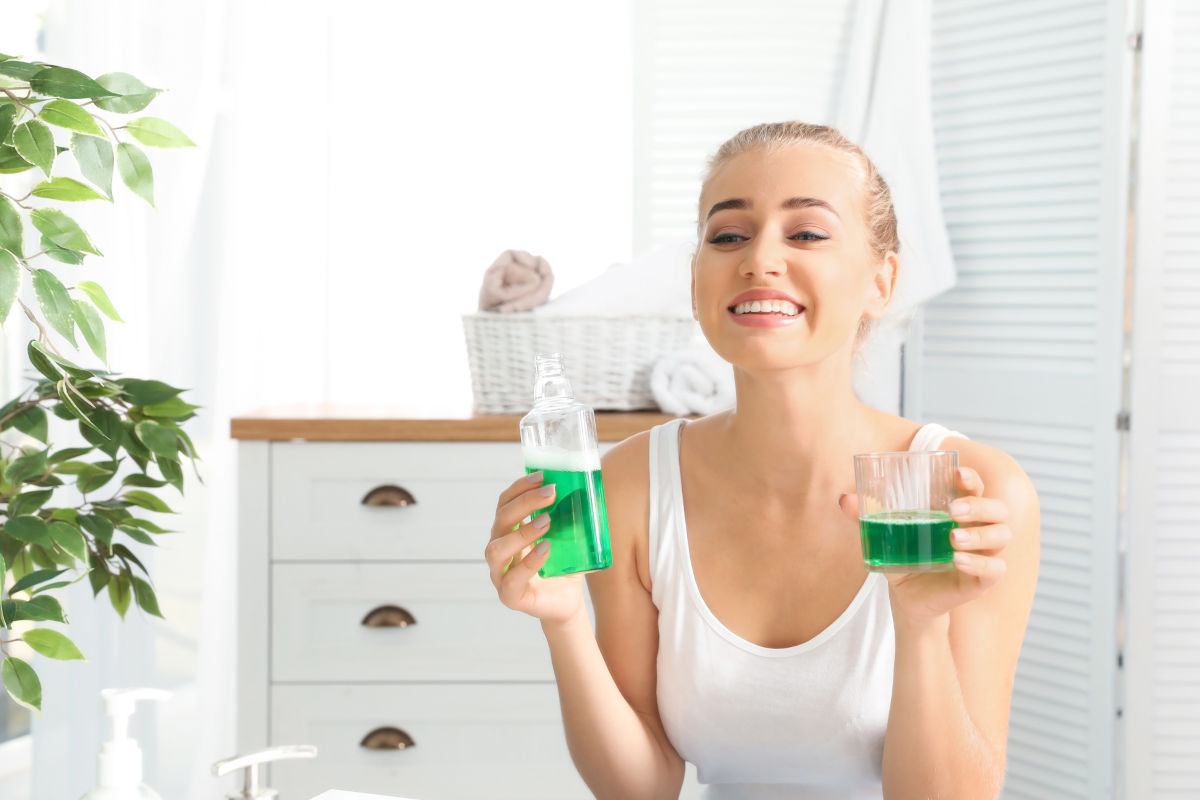Contents

Mouthwash: How to Choose and Use It Correctly
Do you want to supplement your oral hygiene routine with a mouthwash but don't know which product to choose? No worries, we've put together the ultimate guide to help you make your choice among the many references available on the market.
Discover our expert advice to find the mouthwash best suited to your needs and learn how to use it effectively every day.
Why Use a Mouthwash?
While brushing and flossing remain the essential steps for a healthy mouth, mouthwash is gaining more and more followers, and for good reason. Formulated to address specific issues, it provides many benefits:
- It helps prevent the formation of dental plaque and cavities.
- It helps to freshen breath and provides a pleasant sensation of freshness.
- Some formulas soothe sensitive gums or canker sores.
- Prescribed by a dentist, it can help treat oral infections.
There are two main categories of mouthwash depending on their function:
- Therapeutic mouthwashes, prescribed by a dentist to treat a specific condition (gingivitis, canker sores, post-operative wounds...).
- Cosmetic mouthwashes, intended to complement brushing to maintain long-term oral health and fresh breath.
What Are the Best Alcohol-Free Mouthwashes?
While mouthwashes come in a multitude of flavors, one ingredient sets them apart: the presence or absence of alcohol. While alcohol-based mouth rinses often contain powerful antiseptic agents, they have the disadvantage of drying out and irritating the mucous membranes. That's why we recommend opting for alcohol-free formulas, which are gentler and just as effective.
Among the current bestsellers, 4 products particularly caught our attention:
| Product | Use | Benefits | Indicative Price |
|---|---|---|---|
| TheraBreath Fresh Breath | Against bad breath | Fights odor-causing bacteria, long-lasting fresh effect. | $8 for 16oz |
| Listerine Total Care Zero Alcohol | Cavity and plaque prevention | Complete protection with fluoride, pleasant mild mint taste. | $7 for 1L |
| Crest Pro-Health Gum and Breath Purify | Relief for sensitive gums | Helps reduce bleeding and inflammation, targets plaque bacteria. | $7 for 1L |
| Tom's of Maine Natural Wicked Fresh! | Natural freshness and hygiene | Zinc neutralizes odor, natural ingredients, no artificial flavors. | $6 for 16oz |
A Closer Look at Natural Mouthwashes
Are you a fan of organic and clean cosmetics? Don't miss out on mouthwashes formulated with natural ingredients! Free of alcohol and harsh chemicals, they ensure excellent oral hygiene while being more respectful of teeth and gums.
The star ingredients of these green mouth rinses? Essential oils with cleansing properties and soothing plant extracts like mint, tea tree, or aloe vera. Besides being effective against plaque and bacteria, these products contribute to a more ecological lifestyle with reduced or refillable packaging.
Baking Soda, an Unsuspected Ally for Your Mouth Rinses!
Anti-acid, antiseptic, and slightly whitening, baking soda has more than one trick up its sleeve. This magic powder is indeed an excellent base for making a 100% natural and economical mouthwash!
Very simple to use, just dissolve a teaspoon of baking soda in a glass of warm water, and you're done. Use it as a rinse for 30 seconds after brushing; this homemade mouthwash neutralizes bad breath and helps prevent cavities. For a more pleasant taste, you can add a few drops of peppermint, lemon, or tea tree essential oil.
Our Guide to Using Your Mouthwash Correctly
For optimal effectiveness, there are a few simple rules to follow when using a mouthwash. Here is our advice for properly integrating it into your daily oral hygiene routine:
- Rinse after brushing and using dental floss, to remove all remaining bacteria and particles.
- Pour a dose of the product into the measuring cup then keep it in your mouth for at least 30 seconds.
- During this time, swish the liquid vigorously throughout your mouth, between your teeth and along the gums.
- Spit it out.
- Be sure not to rinse with water afterward to let the active ingredients work longer.
- Perform your mouth rinses 1 to 2 times a day, in the morning and evening.
Note that for antiseptic mouthwashes (like those with CPC or chlorhexidine), it is often recommended not to exceed two weeks of continuous use, at the risk of altering the balance of the oral flora. Ask your dentist for advice to tailor the rinses to your needs.
In Summary
While it doesn't replace conscientious brushing and flossing, mouthwash is a valuable complement to ensure impeccable oral hygiene. By preventing plaque and cavities, soothing sensitive gums, or freshening breath, it brings a real plus to our routine.
To make the right choice among the many references available, opt for targeted products, preferably alcohol-free and enriched with natural active ingredients. With a good formula and by following the usage tips, you will enjoy all the benefits of your mouthwash!
FAQ
Can you use mouthwash every day?
Yes, a daily mouth rinse helps effectively prevent the proliferation of bacteria and the formation of dental plaque. Choose a cosmetic, alcohol-free formula for frequent use without risk.
Mouthwash with or without alcohol?
It's better to prefer an alcohol-free mouthwash, at the risk of irritating the mucous membranes of the mouth and disrupting the oral flora. They are just as effective as the alcohol-based versions for daily use.
How to make a homemade mouthwash?
The simplest and healthiest is to dilute a teaspoon of baking soda in a glass of warm water. You can add a drop of peppermint essential oil for freshness or clove oil for toothaches.
